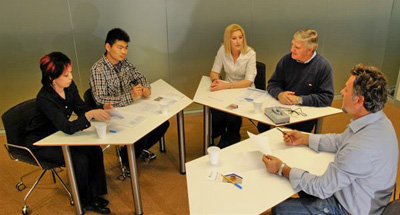Who's who in a mediation?
This page is about:
Who will usually be at the mediation?
Who won't usually be in mediation?

Who will usually be at the mediation?
Mediators
Mediators are professionals trained to help people resolve their disputes. They run the mediation process. Unlike a judge in court, mediators cannot make a decision about the outcome of the dispute, or who is right or wrong. Mediators help people identify issues, develop options, consider alternatives and ideally reach their own solution.
CJC mediations are facilitated by one, or two, nationally accredited mediators.
The CJC mediators will:
Guide you and the other party through discussions about your concerns and issues to see if there are any solutions that may be acceptable to both of you.
Be impartial and not take sides.
Create an environment where everyone has a chance to be heard equally, ensuring that discussions do not get out of control.
Help break down the problem into manageable issues.
Make sure that all relevant issues are covered.
Help you and the other party to think of options that may help to resolve the dispute.
Help you write down the details of any agreement reached.
The CJC mediators will not:
Give legal advice.
Take sides.
Decide who is right or wrong.
Make a decision for you.
Make suggestions about what should happen after the mediation.
Force you to reach an agreement.
Back to top
Participants (or parties)
It is best if all the people who are involved in the dispute attend the mediation. If this is not possible, it may be possible to send a representative, although this is not recommended. It is important that any representative is familiar with the dispute and has authority to make decisions on behalf of the others on the spot.
Back to top
Support people
In some circumstances, a support person may attend with one or more of the people involved in the dispute. Support people do not generally participate in the session. Any arrangements related to support people must be made before the mediation and the other people attending will need to agree whether the support person can attend.
Read more about support people.
Back to top
Interpreters
We can arrange professional
interpreters at no cost to you. Please tell us if you need an interpreter.
Back to top
Who won't usually be at the mediation?
Witnesses
Witnesses are not required at a CJC mediation. Mediation is about coming to an agreement, not about proving what someone said or did.
Back to top
Lawyers
Lawyers are not usually required at CJC mediation because it is not a legal process. It is an opportunity for you to talk directly to the other person or people in your dispute in order to resolve the problem in a safe and informal environment. The mediator will help you to understand each other's point of view and to make your own decisions. If you want to get legal advice or information, you can get it before the mediation, or ask for a break during the mediation session to talk to your lawyer or a legal information service.
In some circumstances, you can request that your lawyer attend mediation with you. If you request this, we will consider:
Why you need a lawyer to attend.
What role your lawyer would play.
Whether the other person or people attending mediation will wish to bring a lawyer.
Whether the other person or people agree to your lawyer attending.
After considering all these factors, a decision will be made by the CJC Director about whether a lawyer may attend.
Back to top
Children
Please make childcare arrangements for your children, as mediation is not a suitable environment for them. There are no childminding facilities at any mediation venues.
Back to top